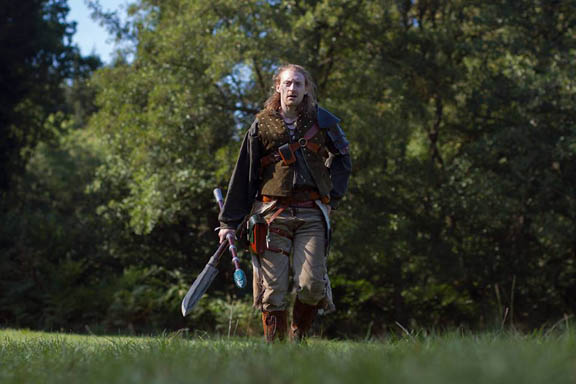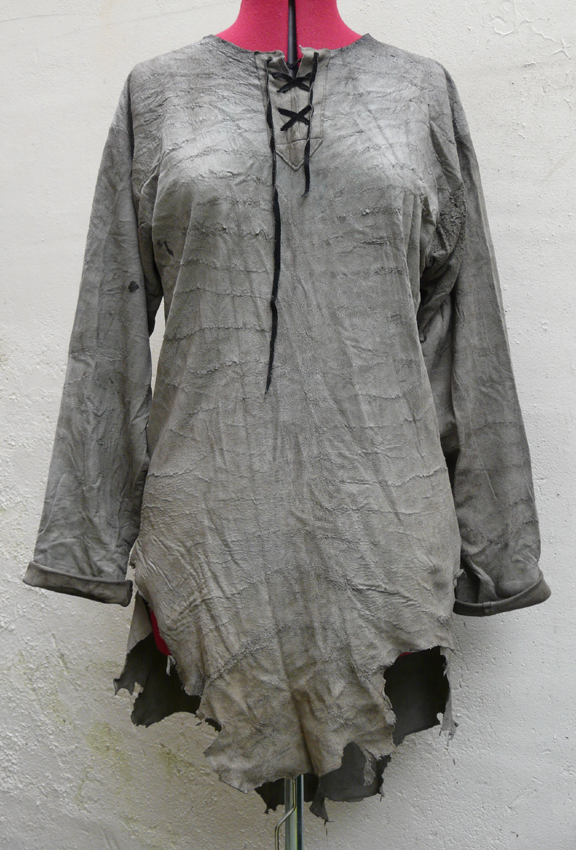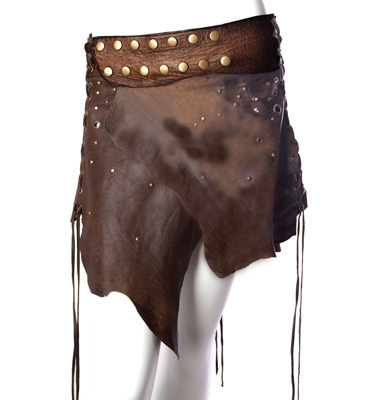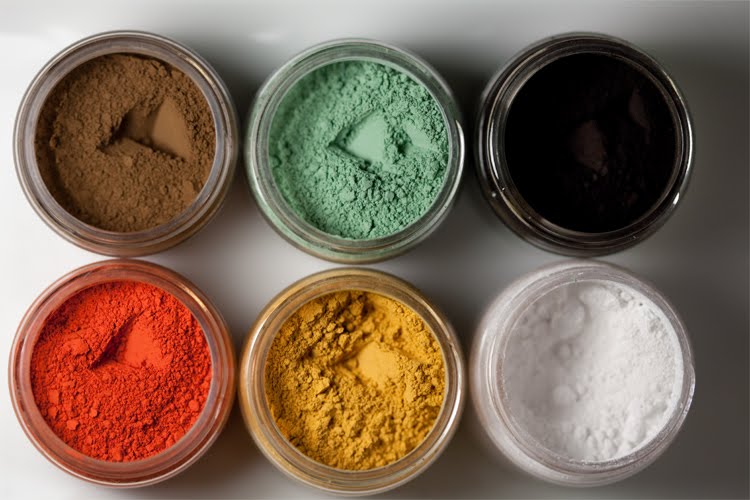Navarr costumes
Note: The tone and style of this page may need editing. All costume advice pages should be written in third person voice, using verbs that make clear that this page is advice, not direction.
This page aims to offer help in creating a Navarr costume for those who want it. It provides a list of resources that players looking to create a costume, either purchasing one or making one may find useful. There is no one way to create the perfect costume, but the suggestions on this page will help to produce a great costume for Empire.
Overview
Practicality is a core value for the Navarr. Because they typically spend a great deal of time in the forest, it is rare to find Navarri wearing clothing that could snag or trip them up as they walk through tough terrain. A character might find themselves at the sharp end of some Navarri wit if their costume is excessively showy and expensive-looking. If on the other hand, one's clothing looks a decade old and extensively repaired, nobody will bat an eye.
Decoration of clothes and accessories is common but not essential, especially for new characters. Decorative items are a good way to make a statement about the character, but they should not be a burden to carry. Thorn, leaf, and flower motifs are often found, as are any other things you might find in a forest. Bones, stones, feathers, leaves - if you can pick it up off the forest floor then it's suitable.
The woodland and autumnal colour palette is very important for Navarr, bringing the nation's look together far more than anything else. Sticking to browns and greens for the most part is a good rule of thumb; smaller amounts of amber, cream and blood red are also common. Conversely, bright colours (including white) that other nations might use to draw attention to themselves are to be generally avoided, except as accents.
If in doubt, ask yourself "would I go hunting in this?". If you can walk through brambles without your sleeves, trousers and/or dress getting hopelessly snagged and torn, you're on the right track. And if you can hide from a bandit in the undergrowth, so much the better.
Appropriate fabrics: Wool, linen, cotton (or synthetic substitutes that have the look) are all good - sticking to the colour palette is more important than what your clothes are made of. Furs and leathers are also good, but keep in mind that they might be difficult to wash for both you and your character. Plain colours that are then decorated or trimmed are more common than patterns but the Navarr are a resourceful people and their clothes are made of whatever they happened to buy in the market they were at that week, and that could be anywhere in the Empire. There's nothing wrong with standing out because you look good, as long as you're not sacrificing your mobility or your ability to get things done.

A Navarr Thorn, armed and ready to fight
10 Quick Tips
- Woodland colours, even autumnal are the palette.
- Layers. A shirt with a tunic with some leather with a cloak will look epic with pouches and belts. But also remember you can take those layers off.
- Feathers and beads are cheap accessories that will make kit pop. (but avoid looking like a native American!)
- Belts and pouches are practical and very popular, but try to avoid webbing. Make sure you can use all those pouches too.
- Sew patches onto stuff.
- If it starts looking worn you won.
- See this article on LARP GUIDE for tips on making things look dusty/lived-in.
- Remember tattoos matter. The moment someone sees them you are identified as navarr (or someone from another nation that needs skinning)
- Practical practical practical
- Remember not to feel disheartened when looking at other people's kit. Feel free to ask advice - everybody remembers what it was like to be a new player.
Making Guides and Examples
Navarr costumes, being mostly leather and fur, require some care and specialist knowledge to create at home. For those people who are unfamiliar with leather work, there are plenty of resources available on the internet.
The garments will be simple, and can be based around t-tunics, with a fabric tunic as a base layer and a leather tunic with or without sleeves on top. Light, soft garment suede can generally be sewn on a regular sewing machine providing a stronger (leather specific) needle is used. These are generally available from most sewing and hobby retailers. In this way many of the instructions for making simple fabric items can be duplicated with lightweight leather, though remember leather does not fray like fabric so edges can be left 'as cut' so check any allowances on patterns for hems and seams.
The easiest way to machine sew light leather is to apply a thin line of general purpose glue along the intended stitch line of each piece, this holds them securely in place whilst running each section through your machine. It is recommended to test a small sample with your machine first. Depending on the size of the hide used, for a rougher, more natural edge to a shirt or tunic the leather can be left uncut along the base or round the cuffs.
Leather or suede trousers are a staple of Navarr costumes and if care is taken to hide or remove modern belt loops, pockets and zips, leather 'jeans' will be perfectly suitable. Trousers in suede, and brown or green would be preferable to shiny black leather if possible. Leather and fur coats can also be adapted by removing collars, sleeves and buttons to make a robe or waistcoat style coat. Skirts and loin cloths can be made by lacing or sewing a piece (or lots of small pieces) of leather, suede or fur to a belt which can then be buckled around the waist.
Similarly old or damaged parts of existing soft leather costumes can be used to good effect by cutting away excess for a skirt or loin cloths, combining different items in a patchwork of repair to make a single servicable item or simply shredding them to provide cosmetic effect of repaired patches to existing kit.
Decorations will take the form of natural objects like feathers,gemstones, bones, and beads made from wood, stones, clay and shells, which are all readily available through craft shops and online. Leather lacing and decorative stitching using leather thonging can be used in place of embroidery. Acrylic paint is excellent for decorating fabric and leather and is cheap and easy to use. Colours should reflect natural pigments where possible.
Overall, costumes for the Navarr should appear well used, comfortable and practical. Pieces of old costume can be gathered from friends and past characters, or found second hand in charity or vintage shops for a worn and pieced together look.
Armour
Thick hardened leather is the most common form of armour for the Navarr, occasionally supplemented with light chain or scale. Navarr armour often features an asymmetric pattern, with lines and closures that run diagonally across the body rather than vertically.
Existing suede jacks or lighter armour can be augmented with additional rigid leather plates either riveted or laced into place. Card templates may be overlaid to ensure sufficient clearance is left for existing buckles, lacing etc and are easily adjusted to provide a wide variety of patterns and combinations. Such templates can also ensure the most effective use of potentially expensive materials, minimising wastage and even enabling creative use of cheaper offcuts.
Over a single breastplate a simple sleeveless waistcoat may be worn. Extending down to protect the thighs and split at the sides it can be left open at the front, held to the body with a simple belt. Whilst revealing the tougher armour underneath and maintaining flexibility around the waist, additional heavy leather plates or sections of chain can be riveted or laced in place to give further protection to the upper legs.
Children
Navarr children will wear simplified versions of adult clothing - garments that are practical for play but also easy to keep clean. For toddlers and babies, smocks, or simple t-tunics and drawstring trousers are simple and easy to pull-on garments, that can be made in linen or cotton for easy washing! These types of clothes also have plenty of flexibility in terms of size, meaning you'll get more than one year's use out of them. Small coifs, made as described above are great for keeping the sun off a baby's head and simple straw hats can also be used to stop children burning. Older children can either have their own costumes, or be given adult clothes which are then rolled up and belted to fit - the practical Navarr are unlikely to waste any clothing and hand me downs are a cheap (in and out of character!) way to clothe your children!
When making costumes for smaller children, remember to avoid anything tight around the neck - strings, cloaks, hats on cords etc and in addition, all tabards should secure under the arms. Make sleeves and armholes wider than needed; they're the bits that get tight as they grow. Neck holes also need to be bigger than for adults or should fasten at the back.
- Information on clothes and swaddling for babies
- Patterns for Medieval children's clothes
- Revival Clothing's Premade items for children
- Gambeson's Premade items for children
Suppliers
Armour
- Totally Leathered Totally Leathered provides custom tooled leatherwork & bespoke armour.
- Idiom Productions Costume and Props Workshop creates custom hand-tooled leather armour, clothing and LRP weapons
- Darkblade Leather armour and hoods (note that some of the leather armour on the general page is more appropriate than the nation specific armour. The leaf armour is not particularly good for Navarr)
Leather
- Le Prevo Leather, furs, leatherworking supplies and resources.
- Lyon's Leathers Wide range of leathers, suedes and buckles.
- Tandy Leather Factory Leather and leatherworking supplies.


